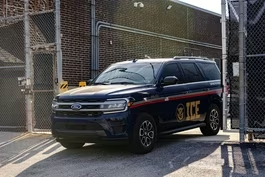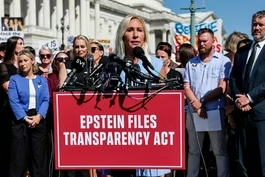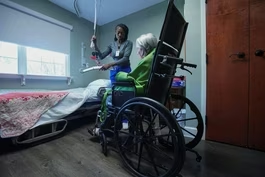
How Trump sanctions imposed on the ICC are taking its toll
Clip: 11/15/2025 | 9m 5sVideo has Closed Captions
How sanctions imposed by Trump are taking a toll on the International Criminal Court
The International Criminal Court, or ICC, only intervenes when national courts can't or won't prosecute crimes like genocide and crimes against humanity. But after the Trump administration sanctioned several members of the court this year, Americans trying to prosecute some of the world's worst crimes at the ICC are discovering those sanctions are preventing them from doing that. Kira Kay reports.
Problems playing video? | Closed Captioning Feedback
Problems playing video? | Closed Captioning Feedback
Major corporate funding for the PBS News Hour is provided by BDO, BNSF, Consumer Cellular, American Cruise Lines, and Raymond James. Funding for the PBS NewsHour Weekend is provided by...

How Trump sanctions imposed on the ICC are taking its toll
Clip: 11/15/2025 | 9m 5sVideo has Closed Captions
The International Criminal Court, or ICC, only intervenes when national courts can't or won't prosecute crimes like genocide and crimes against humanity. But after the Trump administration sanctioned several members of the court this year, Americans trying to prosecute some of the world's worst crimes at the ICC are discovering those sanctions are preventing them from doing that. Kira Kay reports.
Problems playing video? | Closed Captioning Feedback
How to Watch PBS News Hour
PBS News Hour is available to stream on pbs.org and the free PBS App, available on iPhone, Apple TV, Android TV, Android smartphones, Amazon Fire TV, Amazon Fire Tablet, Roku, Samsung Smart TV, and Vizio.
Providing Support for PBS.org
Learn Moreabout PBS online sponsorshipJohn: The international criminal court, or icc, is known as the court of last resort.
It only intervenes when national courts can't or won't prosecute crimes like genocide and crimes against humanity.
This year, the trump administration sanctioned several members of the court, saying it targets the united States and Israel.
And now Americans trying to prosecute some of the world's worst crimes at the icc are discovering that those sanctions are preventing them from doing that.
Special correspondent Kira Kay has the story.
Kira: In northern Uganda residents gathered in September to witness a scene 20 years in the making.
Criminal charges presented against warlord Joseph kony accused of killing and kidnapping thousands during his decade in the region.
He prosecutor is thousands of miles away at the international criminal court in the Netherland also known as the icc.
Kony himself is not in the courtroom, he remains on the run despite a six year mission by U.S.
Special forces to hunt him down.
>> The war was unbearable.
Finding your way between bullets and dead bodies.
We walked until our legs were torn.
Kira: Nancy was one of kony's victims, objected at age 12.
Now she hopes kony will turn himself in.
>> If our voices reach kony where he is, he should listen humbly and return home.
That way the person offending him can work more easily on his behalf.
Kira: Joseph kony's was the first to have such a hearing in icc history, as it tries to make sure the case does not stall indefinitely.
The tribunal has faced criticism since it was created in 2002 about being slow and selective in its cases, so far only convicting Africans.
Molly covers the icc for the associated press.
>> It is not convicted many defendants for all the time and money passed.
Victims want justice, to feel the wrong done to them will be punished in some way.
Kira: More than 120 countries agree and are members of the icc , but the U.S.
Is not one of them.
It fears the court could prosecute Americans.
Despite this, many U.S.
Citizens still work there.
>> A number of U.S.
Trial membersre members.
When it benefits U.S.
Foreign policy the U.S.
Has been a big fan of the court in a lot of ways.
When it does not benefit U.S.
Foreign policy, they have not been a big fan.
Kira: American human rights workers also assist the court like Matthew Smith, who runs an organization that investigates abuses including attacks like those against the rohingya.
>> I was there when the military was burning villages down, men, women, children.
Burning bodies alive.
The former prosecutor at the icc launched investigation.
Kira: But those efforts are in jeopardy as the icc itself has come under attack.
From the trump administration.
>> The icc has engaged in eligible to and baseless actions targeting America and our close ally Israel.
>> I have applications for warns of arrest.
Kira: The court indicted is really prime minister Netanyahu and his former defense minister for alleged crimes in gaza.
The icc recognizes palestine as a state member of the court and says it can prosecute crimes that happen there.
But just 18 days into his presidency, trump declared the icc had abused its power by charging nonmember state Israel.
>> Its maligned conduct threatens to infringe U.S.
Sovereignty and undermine our critical national security and foreign policy work.
Kira: The U.S.
Treasury imposed economic sanctions on nine icc personnel, six judges, two deputy prosecutors in the court's top prosecutor, all who were working on the gaza case or who had once investigated American troops actions in Afghanistan.
The sanctions are unprecedented, says Molly.
>> They are extremely harsh penalties usually reserved for extremist groups, hostile governments.
It makes it difficult to get bank accounts, you cannot travel to the U.S., and it creates problems.
Kira: Ground zero of the sanctions impact is the office of the prosecutor.
Microsoft cut off the chief prosecutor's email, likely fearing fines.
His bank accounts were also frozen.
Cases are now caught in the crossfire as staffers grapple to work around the sanctions.
>> It does provide material support which includes doing research for legal briefs he is going to sign off on, and give him ideas for an investigation you're working on.
Because so much of this has never been done before people don't have a clear understanding of how the secondary sanctions will be pursued by the trump administration.
Kira: Matthew Smith was about to bring new evidence to the icc when the sanctions hit.
>> We have come into contact with somebody who was in the Myanmar military, who has since defected, who was on the ground during these genocidal attacks in 2017.
We are taking that evidence, sharing it onward.
If we can't do that, if we can't speak freely, we can't do any of our work.
Kira: Smith filed a federal lawsuit in his home state of Maine along with the help of the American civil liberties union.
He claims the sanctions are a violation of his first minute rights and put him at risk.
>> I face severe penalties for doing the work I do.
That could involve up to a one million-dollar fine, prison sentences up to 20 years.
To simply sit back and stop that work because the white house says we need to do that is unacceptable.
Kira: Joining him in the suit is a lawyer, she facilitates gender-based violence charges at the icc, and says sanctions of ground her work to a halt.
>> I have been working with women from Afghanistan.
There is no woman's rights crisis in the world that looks like Afghanistan's right now.
I was in the court in December with a group of women seeking justice, and I can't work with them on that anymore.
You have to wonder how this will not cause paralysis across the entirety of the system of those working in the court.
Kira: Within the icc, sanctions have driven some employees to quit, including the top investigator in the gaza case.
He has children who live in the U.S.. Others have sued to receive waivers from the treasury department, to be allowed to work with sanctioned individuals, but are still barred from working on the gaza case.
In a U.N.
Meeting in July the state department's legal advisor suggested broader sanctions could becoming.
>> We expect all icc actions against the U.S.
And our ally Israel to be terminated.
If not, all options remain on the table.
Kira: The assembly of member states of the icc says the court acted within its legal mandate and cannot reverse charges that have been filed.
But there are mounting fears the court's ability to function may be in jeopardy.
>> It is hard to imagine a world where we don't have this institution, but I think what can be done -- the U.S.
Is a large, powerful country with a lot of interests.
That makes it difficult when it is hostile toward you.
Kira: Back in Uganda courts representatives explained the 39 charges against Joseph kony cannot advance to trial until he is actually found.
The people gathered here know it could be a long wait before their justice is delivered, if ever.
Still, they see the icc's work on behalf of their community as a critical step forward.
>> The fact people are adding to know what they went through, this is justice.
Kira: For pbs news weekend, I'm Kira Kay.
♪
News Wrap: Agents make immigration arrests in North Carolina
Video has Closed Captions
Clip: 11/15/2025 | 2m 53s | News Wrap: Federal agents begin making immigration arrests in North Carolina (2m 53s)
Trump feuds with MAGA ally ahead of vote on Epstein files
Video has Closed Captions
Clip: 11/15/2025 | 5m 47s | Trump feuds with MAGA ally ahead of vote to release Epstein files (5m 47s)
Why one man is defying his genetic destiny with Alzheimer's
Video has Closed Captions
Clip: 11/15/2025 | 5m 51s | Why one man with a genetic predisposition for Alzheimer's disease is defying the odds (5m 51s)
Providing Support for PBS.org
Learn Moreabout PBS online sponsorship
- News and Public Affairs

FRONTLINE is investigative journalism that questions, explains and changes our world.

- News and Public Affairs

Amanpour and Company features conversations with leaders and decision makers.












Support for PBS provided by:
Major corporate funding for the PBS News Hour is provided by BDO, BNSF, Consumer Cellular, American Cruise Lines, and Raymond James. Funding for the PBS NewsHour Weekend is provided by...


